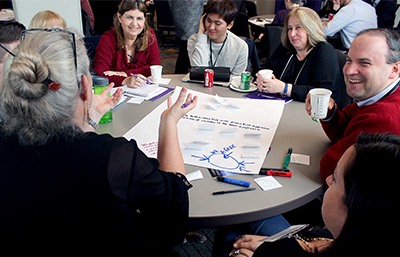Symposium One: Effective Models, Frameworks, and Approaches (2017)

Proceedings from the Ed-ICT International Network: Disabled students, ICT, post-compulsory education & employment: In search of new solutions
March 14-15, 2017
University of Washington
Seattle, Washington
Funded for three years by The Leverhulme Trust, this International Network is co-organized by Jane Seale (The Open University, UK); Tali Heiman (Open University, Israel); Sheryl Burgstahler (University of Washington, US); Catherine Fichten (Dawson College, Canada) and Björn Fisseler (FernUniversität, Germany).
The Ed-ICT International network is exploring the role that information and communication technologies (ICTs)—including computers, assistive technologies, online learning, social networking sites— play or could play in causing the disadvantage or removing the disadvantage that students with disabilities experience in post-compulsory/post-secondary education generally and specifically in relation to social, emotional, and educational outcomes.
The network also examines the practices required of educators and other stakeholders to mediate successful and supportive relationships between learners with disabilities and ICT. The Network is working to
- synthesize and compare the research evidence that is available across the five countries regarding the relationship between students with disabilities, ICTs and post-compulsory education;
- construct theoretical explanations for why ICTs have not yet brought about the reductions in discrimination, disadvantage and exclusion that were predicted when equality and discrimination related laws were published across the five countries; and
- provide new perspectives about potential future solutions regarding how post-compulsory education institutions can better use ICTs to remove the ongoing problems of disadvantage and exclusion of students with disabilities.
In order to meet these objectives five international symposia will be held over three years with five broad themes:
- Effective models, frameworks, and approaches
- Stakeholder roles
- New designs
- Effective practices
- New solutions
For each symposium, 20 local stakeholders from any or all of the following groups will be invited to participate:
- students with disabilities;
- faculty (lecturers, professors);
- professionals responsible for support services for students with disabilities (e.g., access technologists) in post-compulsory education;
- professionals responsible for faculty/staff development;
- campus information technology staff;
- digital textbook and resource publishers;
- other individuals who work to support the academic success of students with disabilities; and
- senior institutional managers and administrators.